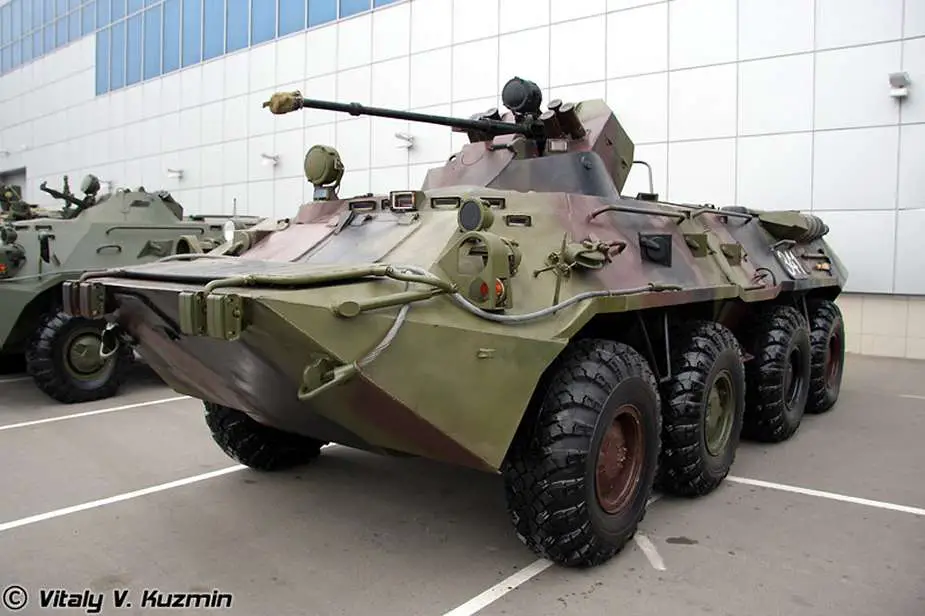Breaking news
Serbia purchases 26 BTR-80A infantry fighting vehicles from Hungary.
According to Srbija Danas on January 17, 2024, Serbia has recently finalized the purchase of 26 BTR-80A armored infantry fighting vehicles (IFVs) from Hungary. This acquisition follows Hungary's decision to phase out these Russian-made vehicles in favor of more modern alternatives, such as the German-manufactured KF41 Lynx IFVs.
Follow Army Recognition on Google News at this link

The BTR-80A represents an improvement over its predecessor, the BTR-80 APC, featuring a one-person turret equipped with a 30 mm 2A72 cannon and a 7.62 mm PKTM machine gun. (Picture source: Vitaly Kuzmin)
The BTR-80A, an 8x8 armored personnel carrier (APC) produced by the Russian Arzamas Machinery Construction Plant, serves various roles on the battlefield, including personnel transport, close fire support, reconnaissance, combat support, and patrolling. This model represents an improvement over its predecessor, the BTR-80 APC, featuring a one-person turret equipped with a 30 mm 2A72 cannon and a 7.62 mm PKTM machine gun. For defensive purposes, it is also equipped with electrically operated 81 mm smoke grenade launchers on each side of the turret. The vehicle's hull is constructed with all-welded steel armor, providing enhanced protection over its frontal arc compared to previous versions.
One notable feature of the BTR-80A is its capacity to accommodate a crew of two and eight troops. Additionally, it is fully amphibious, featuring a water-jet propulsion system at the rear, which enables it to cross bodies of water efficiently. Other features include power steering, a central tire pressure system, an NBC system, and a self-recovery winch. The BTR-80A is capable of reaching a maximum road speed of 80 km/h and a water speed of 9 km/h, with an operational range spanning from 600 to 800 kilometers.
As of 2022, the Serbian Armed Forces maintained a diverse fleet of reconnaissance vehicles, including 46 BRDM-2 and 30 BRDM-2M vehicles. Additionally, their inventory included 335 infantry fighting vehicles (IFVs), comprising 320 M-80, 3 M80AB1, and 12 Lazar-3 IFVs. Furthermore, they possessed a total of 95 armored personnel carriers (APCs), consisting of 44 tracked APCs, including 12 BTR-50 and 32 MT-LB vehicles, as well as 51 wheeled APCs, featuring 39 BOV-VP M-86 and 12 Lazar-3 APCs. In addition to these vehicles, they had 25 Armored Utility Vehicles (AUV) based on the BOV M16 Milos.
Hungary's decision to sell these BTR-80A vehicles is part of a broader strategy to modernize its military fleet. Originally, Hungary received 555 BTR-80 armored fighting vehicles between 1996 and 1999 as part of a compensation agreement for joint state debt with Russia. While some vehicles underwent modernization efforts between 2006 and 2010, a significant portion of the fleet became obsolete. Although the sold BTR-80As are equipped with night vision and advanced communication systems, they are no longer considered adequate to meet Hungary's evolving defense needs.
In place of the BTR-80A, Hungary is transitioning to the KF41 Lynx infantry fighting vehicles, designed and manufactured by the German company Rheinmetall Landsysteme GmbH. The KF41 Lynx, introduced in June 2018, is part of the Lynx family of tracked armored vehicles and is characterized by its modularity and enhanced protection. It is longer and more powerful than its predecessor, the KF31 IFV, with a length of 7.7 meters and a heavier weight. The KF41 Lynx features a modular design that allows for customization based on specific mission and role requirements, consisting of a basic vehicle and specialist mission equipment. This approach provides flexibility and cost-effectiveness by using common mobility assemblies and protection components while adding role-specific equipment as needed.
In September 2020, the Hungarian Ministry of Defence awarded Rheinmetall a contract worth over €2 billion to supply Hungary with Lynx infantry fighting vehicles and related products and services. In the first production phase, Hungary received 46 Lynx IFVs manufactured in Germany, with the first vehicle transferred to the Hungarian military in October 2022. Starting at the end of 2023, the remaining Lynx vehicles will be produced in Hungary by Rheinmetall Hungary Zrt., a joint venture company co-owned by Rheinmetall (51%) and the Hungarian state (49%).
Rheinmetall's ultramodern facility in Zalaegerszeg, inaugurated in August 2023, will play a crucial role in the development and production of state-of-the-art wheeled and tracked armored fighting vehicles for the Hungarian armed forces. This includes the Lynx KF41 family and the Evo version of the Panther KF51 main battle tank. The contract originally envisioned seven variants of the Lynx KF41 for the Hungarian military, covering roles such as infantry fighting, command post, reconnaissance, forward artillery observation, mortar support, field ambulance, driver education, and even mobile air defense with a Skyranger 30 turret. A contract for the conceptual development of this air defense variant was signed in December 2023.























